A Malaysian farmer has found a way to help his community and prevent food wastage during the CCP virus crisis by donating surplus vegetables to people in need.
Simon Leong, the president of the Sabah Kundasang Agriculture Operators Association, has run a 40-acre farm in the Malaysian town of Kundasang in Sabah for over three decades. In the wake of the spreading pandemic, Leong has taken it upon himself to ensure that neither his nor his fellow farmers’ vegetables go to waste.





